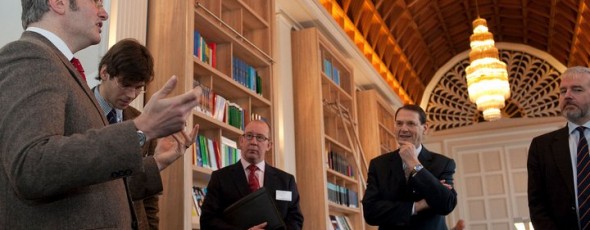Maastricht, January 21, 2011
Dear colleagues, Dutch University Presidents, Dear Friends,
I am most grateful for your presence here tonight. I thank you for your collegiality in the past eight years while I served as President of Maastricht University. I have appreciated the friendliness with which you took in my drive and sometimes even seemed to enjoy the ensuing excitement.
Nobody expects me to set all of sudden my seriousness and drive aside, although there is some hope for entertainment. Let me make it clear: that hope is idle. I reassure you that I will not disappoint and remain my serious self and use the opportunity to call on you to remain unified, to become even more unified in entering the future years, with the motto: “the only cheddar is in the mousetrap, baby” with the rationale: “you can raise taxes with it”.
You can raise taxes with it
Thomas Edison is the inventor of electricity, or better our use of electricity. There is the anecdote of the congressman who came to visit Edison to interrogate him sharply: Mister Edison, this is great play, but what (the hell, he probably thought) can you do with it.
Edison’s reply was: “I don’t know, but you can presumably raise taxes with it.
Robert de Sorbon might have said something similar in the 12th century at the foundation of the Paris University, if he would have been questioned by a political strongman on the usefulness of the university.
Nowadays no one in his right mind would question the usefulness of electricity. But it appears that universities have to prove their necessity time and again. And that is weird.
It is weird to listen to a debate on the higher education budget in Parliament as I recently did. In that debate research universities and polytechnics were pushed into one group of a class of infants, and told by a stern headmaster how things really should be done. The headmaster also spoke about punishing the institutions for lazy students, after having taken away the instruments and incentives to prod them out either after successful completion of their studies or without (“Time is up”!).
The Netherlands is not the exception. All over Europe politicians seem not yet convinced of the usefulness of the electricity of universities.
I surmise that this is the result of the chaotic massification of universities in the 70’s and 80’s. Almost all present EU countries have a commission carefully planning the massification. This was in The Netherlands the Government Commission headed by Prof. Posthumus, who produced a well balanced expansion plan for higher education in 1968.
But universities and politics alike let them selves to be carried away by the kick of growth, even though universities could plainly see early in the seventies that they were losing the free thinking and enquiring academy and the dedication to excellence. In the nineties I witnessed – often with surprise bordering on horror – how little universities were able to think about their own future as a result of the addiction to growth in combination with a lack of responsibility for decision making, engendered by a word with a warm taste: democratization, but de facto leading to structural anarchy.
The last 15 years research universities have excelled in all international competitions in research and teaching. Table 2.2 of my book on European Universities shows The Netherlands among the five best countries in the world if we look at top universities (top 200) in relation to the size of the population. Also graduates from Dutch universities find relatively easy good jobs on the international labor market.
The only cheddar is in the mousetrap baby
Dutch universities perform well but are little appreciated. Chair Veerman of a Review Committee on higher education suggested recently that they have to restructure, while the present Cabinet imposes a 20% cut on university budget along the line of punishment for lazy students.
What does this mean for the VSNU?
In the first place that the Dutch universities are more than ever challenged to develop an own vision of the future of Dutch universities, which is not based on short term self interest.
Ingredients are: less Government finance, higher tuition fees and more responsibility for the throughput as well as the social relevance of education (shorter duration of unemployment, an even better connection with the labor market for graduates) and of research (take questions from society serious).
The most important is to hang together if it only is to avoid to be hanged separately. Is that possible in the present VSNU? I would suggest that this can only be achieved with a much reinforced executive board, which includes international experts, who have no connections with any of the Dutch universities.
Surely, that is a risky road, but it also one which promises high returns. And then, my friends, please realize: “The only cheddar is in the mousetrap”.
Jo Ritzen




